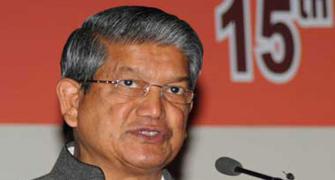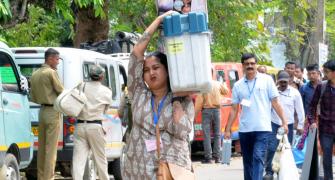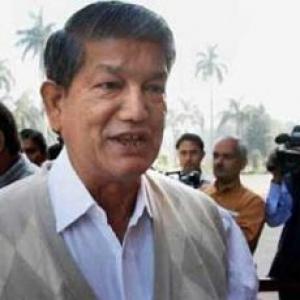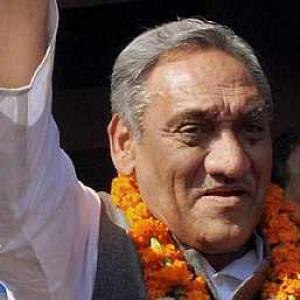After Arunachal Pradesh and Uttarakhand, discontent is brewing among Congress MLAs in Manipur. Aditi Phadnis analyses the situation.

In 2014, though the Bharatiya Janata Party-led alliance posted a stunning Lok Sabha victory, the Congress drew comfort from the fact that it had a government in eight states.
In the past few weeks, the party has seen two states slip out of its grasp and is fighting for survival in a third. After Arunachal Pradesh, Uttarakhand , another Congress-ruled state, went under President’s Rule on Sunday, hours before the Harish Rawat government was to prove its majority.
Here's an analysis of the situation in all the three states: Arunachal Pradesh, Uttarakhand and Manipur.
Arunachal Pradesh: Government toppled from within
 The new chief minister of Arunachal Pradesh and chief of the People's Party of Arunachal, the country's newest political party, formed barely a month before, is an interesting man.
The new chief minister of Arunachal Pradesh and chief of the People's Party of Arunachal, the country's newest political party, formed barely a month before, is an interesting man.
Kalikho Pul, left, has pulled off the seemingly impossible task of breaking the ruling 47-member Congress Legislature Party in the state assembly (which had 60 members), headed by Nabam Tuki. And, with the help of 11 BJP and two independent legislators, forming a government of rebel Congress MLAs.
Pul became a rebel after he was dismissed from the Tuki government in mid-2015. He was the finance minister and was shifted to health. When he publicly criticised the way the government was handling its finances, he was dropped from the council of ministers and also expelled from the Congress.
Tuki was, at the time, facing a problem of plenty. With every second legislator a Congressman, it was hard for him to distribute offices.
Two legislators fell out at first. This sounded alarm bells for Tuki, who became strict, verging on the dictatorial. He took signed resignation letters from MLAs, promising them these would stay with him. He controlled the legislative assembly with the help of his cousin Nebam Rebhia, whom he appointed speaker.
Tuki relied on the fact that the S R Bommai judgement on defection and the testing of majority was clear -- the majority of any government needed to be tested on the floor of the House, not in the Raj Bhavan. As long as he had his man as speaker, he could control the House.
Pul's first task, then, was to topple the speaker and replace him. He opted to work on the deputy speaker and sought to introduce a motion in the assembly that argued the speaker was being dictatorial in his conduct and needed to be replaced.
When Congress MLAs saw that Pul had half a chance of succeeding in his mission, many of them decided to back him.
It is here that the governor's role becomes crucial. The governor was contacted and told to bring forward the date of convening the assembly: If the government had to be toppled, speed was of the essence.
Using his power of discretion (which cannot be questioned in a court of law) Governor J P Rajkhowa advanced the date of the assembly's convening.
The Tuki government cried foul and went to court.
In a letter to the governor, Tuki asked him to work according to the Constitution. 'The actions of directly calling commissioners and secretaries of various departments to Raj Bhavan and asking them to directly report to the governor has diluted the constitutional provisions, wherein it is required to take any report through the chief minister or the council of ministers,' Tuki's letter said.
Simultaneously, the governor ordered that a session of the assembly be convened.
When MLAs went to the assembly premises, they found it locked. The assembly was convened in a nearby hotel and the speaker replaced.
The new speaker allowed a motion of no-confidence to be passed against the government. With that done, it was a matter of electing a new legislature party head. It was made easier because MLAs loyal to Tuki boycotted the 'session' and BJP members supported the motion. And, Pul became CM on February 19.
Uttarakhand: Adversaries from own house
 When Raj Babbar was named the Congress candidate for the Rajya Sabha seat from the state, former chief minister Vijay Bahuguna, left, expecting to be the party’s nominee, was very disappointed. For sometime, he'd been trying to rehabilitate himself, after the government headed by him was held to be a big failure in dealing with floods in the state.
When Raj Babbar was named the Congress candidate for the Rajya Sabha seat from the state, former chief minister Vijay Bahuguna, left, expecting to be the party’s nominee, was very disappointed. For sometime, he'd been trying to rehabilitate himself, after the government headed by him was held to be a big failure in dealing with floods in the state.
It had resulted in Bahuguna being replaced with Harish Rawat.
The denouement came amid chatter that Bahuguna had been hobnobbing with the BJP in the legislative assembly over money bills. As Speaker Govind Singh Kunjwal called for passage of the budgetary motion in the 70-member assembly, where 68 were present and voting, Bahuguna and eight other Congress MLAs demanded a division (counting) of votes. The speaker rejected the demand and adjourned the House till March 28.
Immediately, all the nine Congress MLAs joined BJP members in demanding dismissal of the Rawat government, saying the CM had lost his majority. They also sat on a dharna in the assembly.
As the bill that had been 'defeated' was the appropriations bill (or the budget) the government should have resigned straightaway.
But the speaker deemed the bill passed through voice vote, although 35 of the 68 MLAs present had asked for a division, that is, requested that the votes be counted.
This was the beginning of the collapse of what was essentially a house of cards, with the BJP holding the aces.
Actually, a BJP MLA had, weeks before the budget session, defected to the Congress and even before the speaker could invoke the anti-defection law to expel him, he was made chairman of a board. The BJP then decided to get its own back on Rawat. It found a useful ally in Bahuguna who was already in the rebellion mode.
Rawat then rushed to Delhi and returned to Dehradun the same day, presumably on the strength of some assurances from the high command. He was advised to delay seeking a vote of confidence.
Earlier, some party leaders had tried to defuse the crisis by accepting most of the dissidents’ demands. However, several BJP leaders claimed that 12 Congress MLAs were in touch with them; the BJP has 28 MLAs.
State Congress chief Kishore Upadhayay had claimed the ruling party MLAs were being offered hefty sums of money. A purported sting operation gave heft to the charge. A few days later, the ‘conduits’ between the BJP and the Congress -- party general secretary Anil Gupta and Vijay Bahuguna’s son Saket -- were thrown out of the party.
The BJP MLAs were spirited away to Jaipur, presumably to keep them 'safe' from allurement. For the moment, the assembly has been kept in suspended animation -- which means the governor will administer the state. But, for the BJP, even if it cannot form the government immediately, it is a major victory.
It has been able to topple yet another government, purely by leveraging internal dissidence in the Congress.
Manipur: Restive pot simmers
 Nothing in Manipur is as it seems. At the time of forming his ministry in 2012 for a third consecutive term, Chief Minister Okram Ibobi Singh, left, assured the Congress Legislature Party members that at the end of two and a half years, there would be a major reshuffle to accommodate some of them.
Nothing in Manipur is as it seems. At the time of forming his ministry in 2012 for a third consecutive term, Chief Minister Okram Ibobi Singh, left, assured the Congress Legislature Party members that at the end of two and a half years, there would be a major reshuffle to accommodate some of them.
Under the statutory provisions, in a 60-member assembly, the chief minister is allowed a ministry of 12. To circumvent this rule, some prominent legislators were appointed parliamentary secretaries with Cabinet rank.
However, dissidents wanted more. Ibobi Singh found this was easier said than done.
The restive legislators said they wanted ministers whose performance was sub-optimal and those perceived as corrupt to be dropped from the council of ministers.
They had another condition -- that the one man, one post policy be applied strictly. Their target was Gaikhangam, both a minister and the state party chief.
Congress president Sonia Gandhi met representatives of the 25 dissident Congress legislators and decided the party did not want a repeat of Arunachal in Manipur.
The dissidents have made it known that they would change loyalty, either by joining the BJP or forming a new party of their own, if their demands are not met.
The BJP has only recently set down roots in Manipur. The president of its state unit, Thounaojam Chaoba, has been saying a large number of Congress members are seeking admission. Chaoba is strengthened by the fact that for the first time, the BJP won two seats in by-elections in November 2015.
This is not the only challenge to Ibobi Singh’s government. In the tension between Naga and non-Naga tribes in the state, Gaikhangam was caught in the crossfire. As deputy CM and home minister, he reportedly endorsed police action against the Naga Students Front.
Later, realising this could become a politically volatile issue, he took action against the police personnel but the damage was done. Nongthombam Biren, Congress MLA, called a meeting of Naga MLAs at his residence and passed a resolution demanding action against Gaikhangam.
In the legislative assembly of 60 members, the ruling Congress party has 48, the Trinamool Congress has five, Naga People’s Front has four, the BJP has two and the Nationalist Congress Party and the Lok Janshakti Party one each.
If 25 Congress MLAs revolt and join hands with the smaller groups, they can form a government or clear the no-confidence motion against the government.
The situation has not reached that point yet.
The Congress high command has summoned Ibobi Singh and Gaikhangam twice to Delhi in the past week. But, the BJP is beginning to say now the government has lost the confidence of the assembly.
Combined with Naga/non-Naga tensions, the situation could escalate unless Governor V Shanmuganathan (holding additional charge of Manipur along with Meghalaya after the death in office of incumbent V Syed) intervenes.
Either way, the Manipur government is high on the vulnerability index of state governments that can be toppled.











